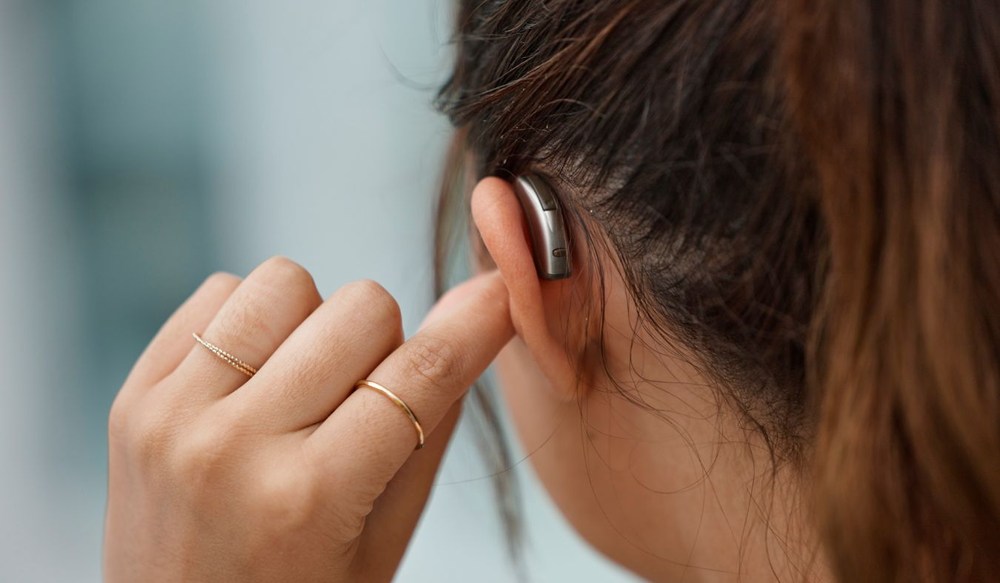Do I Need a Hearing Test? Screening Guidelines After 40
After 40, most of us get more intentional about health maintenance. You

By: admin | April 23, 2024
Music, a universal language, brings joy, solace and inspiration to many. For those who find happiness in the symphony of sound, it’s crucial to consider the health of one’s hearing. With today’s technology, individuals can easily immerse themselves in their favorite tunes at volumes that can sometimes be harmful over time. Just as musicians protect their instruments, listeners should also protect their hearing health. Knowing how to maintain good hearing health while still enjoying music is beneficial for long-term auditory wellness.
The connection between music and hearing loss lies in the volume and duration of exposure. Listening to music at high volumes, especially through headphones or at concerts, can lead to noise-induced hearing loss (NIHL) over time. Prolonged exposure to loud music can damage the delicate hair cells in the inner ear, causing hearing damage. Additionally, certain types of music, such as heavy metal or electronic music with heavy bass, may pose a greater risk due to their intense sound levels. To prevent hearing loss, it’s essential to enjoy music at a moderate volume and limit exposure to loud environments. Regular breaks and using hearing protection, like earplugs, can also help to protect against potential damage.
Once you understand how listening to music too loud can have an impact on your hearing, you should realize how important it is to take care of your hearing health. It’s a key part of how individuals experience the world around them. The human ear is capable of picking up a wide range of sounds, from the softest whisper to the roar of a jet engine. But did you know that exposure to noises above 85 decibels (dBs) can potentially lead to hearing loss over time? This fact highlights the importance of understanding and maintaining good hearing health, especially for music enthusiasts who may frequently be exposed to high volume levels.
Paying attention to your body’s signals is a key step in maintaining good health, and this includes your hearing. If you notice any changes in your ability to hear or understand speech, it could be an early warning sign of potential hearing loss. Some signs to look out for include difficulty following conversations when there’s background noise, frequently asking others to repeat themselves or having the TV or radio volume higher than usual.
Don’t let these signs go unnoticed. Your hearing is a vital part of your overall well-being and quality of life. If you suspect you may be experiencing hearing loss, schedule an appointment with an audiologist as soon as possible. Early detection can make a significant difference in managing and potentially improving your hearing health.
Understanding how loud is too loud can be a bit difficult. Decibels, the unit used to measure sound intensity, can be a good guide to follow, when listening to music or using tools that emit sound. So, what sounds can be too loud? Here is a guide to follow:
Continuous exposure to sounds at or above 85 decibels can potentially lead to hearing loss over time. So next time you’re at a concert or using power tools, consider wearing ear protection. It’s not just about the volume of the sound but also how long you’re exposed to it. If you are working with tools, or going to concerts, make sure to take breaks every so often, as this allows your ears to adjust and keeps them protected from being exposed for long periods of time. If you are not sure which type of protection to bring to a concert or wear when using power tools, contact an audiologist they will be able to assist you in choosing the right protection for your needs.
To ensure you’re listening safely, start by keeping the volume at a comfortable level – ideally below 60% of the maximum volume. Regularly give your ears a break from continuous noise exposure; a good rule of thumb is the 60/60 rule: no more than 60 minutes of listening at no more than 60% volume. Additionally, consider investing in noise-canceling headphones or earplugs during loud events like concerts or sports games. By adopting these simple yet effective habits, you can enjoy your favorite tunes while still prioritizing your hearing health.
Live music events like concerts and festivals are an exciting way to experience your favorite music. However, these events can often reach decibel levels far above what is considered safe for prolonged exposure. It’s not uncommon for concerts to reach volumes of 100-120 decibels, which can potentially lead to hearing loss if you’re not careful.
That doesn’t mean you have to miss out on the fun, though. There are ways to protect your hearing while still enjoying the live music experience. One simple solution is to wear earplugs designed specifically for concerts. These earplugs reduce the volume of the music without distorting the sound quality, allowing you to enjoy the concert safely. When attending a concert, you should avoid being right next to the speakers as well, as this can help to protect your ears from further noise exposure.
In today’s digital age, headphones and earbuds have become almost as essential as our smartphones. They allow us to enjoy music, podcasts and audiobooks on the go. But have you ever stopped to consider their role in your hearing health?
A study by the World Health Organization found that over a billion young people worldwide could be at risk of hearing loss due to unsafe listening practices, including excessive use of headphones and earbuds. This startling statistic emphasizes the need for awareness about safe listening habits. It’s not just about how loud your music is but also how long you’re exposed to it. So next time you reach for your headphones or earbuds, consider lowering the volume and taking regular breaks to protect your ears.
Ever wondered how you can continue to enjoy your favorite music while also protecting your hearing? It’s simpler than you might think! The first step is to be mindful of the volume. As you may know, prolonged exposure to sounds above 85 decibels can potentially lead to hearing loss. When listening to music, especially through headphones or earbuds, try keeping the volume at a comfortable level. You should still be able to hear external sounds around you.
Another proactive measure is using noise-canceling headphones. These devices reduce background noise, allowing you to listen at lower volumes without compromising on sound quality. These small devices, typically made of foam or silicone, can significantly reduce the intensity of sound without compromising the music experience. Disposable foam earplugs are affordable and readily available, making them a convenient choice for concerts and loud events. They effectively block harmful noise while preserving the clarity of music, allowing enthusiasts to enjoy their favorite tunes without risking hearing damage.
Custom earplugs provide a tailored solution for music enthusiasts seeking optimal protection and comfort. These earplugs are molded to fit the individual’s ear canal, ensuring a snug and secure fit. With various filters available, custom earplugs allow wearers to adjust the level of sound reduction according to their preferences, providing versatility for different listening environments.
In addition to earplugs, earmuffs offer another effective means of protecting hearing. Earmuffs are over-the-ear devices that provide a physical barrier against loud noise. Earmuffs come in various designs, including foldable and adjustable models, offering comfort and convenience for extended wear. By combining earplugs or earmuffs with responsible listening practices, music lovers can enjoy their passion while protecting their long-term hearing health.
As much as individuals love music, it’s vital to recognize when your hearing health may be at risk. One of the most important steps towards protecting our auditory well-being is knowing when it’s time to consult an audiologist.
If you’ve noticed changes in your hearing, such as difficulty understanding conversations in noisy environments or needing to increase the volume on your devices more than usual, it might be time to see a professional. Just like getting glasses for vision correction, getting help for your hearing is a proactive step towards maintaining your overall health and quality of life. So, if you find yourself straining to hear your favorite melodies or struggling with everyday conversations, don’t hesitate – reach out to an audiologist today! They will be able to find the right solutions for you. Whether you need hearing aids, assistive listening devices or personal protective equipment, they will find a treatment that benefits your lifestyle, needs and budget.
Just as you would schedule regular check-ups for your eyes or teeth, your hearing deserves the same attention. Regular hearing check-ups can help detect any potential hearing loss early, allowing for more effective hearing loss management and treatment services.
If you’re a music lover who frequently attends live events or listens to music at high volumes, regular hearing check-ups are particularly important. These check-ups can help monitor your hearing health and provide valuable advice on how to continue enjoying music while protecting your ears. Prevention is always better than cure, especially when it comes to your hearing health.
The love for music and the care for your hearing can harmoniously coexist. It’s all about being mindful of volume levels, taking regular breaks and seeking professional advice when needed. You don’t have to sacrifice your favorite tunes to maintain good hearing health.
If you’ve noticed changes in your hearing or if you simply want more information on how to protect your ears while enjoying music, Kevin’s Hearing Clinic is here to help. Our team of dedicated audiologist are ready to assist you in Big City, OH at (123) 456-7890. Don’t let concerns about your auditory well-being dampen the joy of music. Reach out today to preserve your hearing health!
Tags: custom earplugs, hearing loss prevention tips, hearing protection products

After 40, most of us get more intentional about health maintenance. You
By: admin | January 19, 2026

A hearing aid fitting appointment is an important step in your hearing
By: admin | November 18, 2025

Hearing loss can sometimes make everyday situations more difficult, and it
By: admin | August 21, 2025
